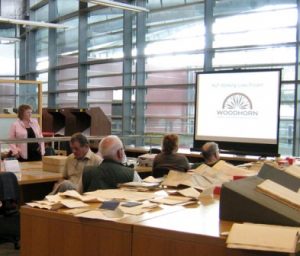
An open day at Northumberland Archives, Woodhorn
I wrote in my very first blog post that my job, Programme Manager for Archives Accreditation, involved getting the whole archives sector to co-create a new standard which will make accreditation a reality and support archive services across the UK to deliver good quality and sustainable services. The programme partners spent the spring and early summer gathering views and discussing everything from the scope of the scheme to detailed wording of requirements. The draft archive service accreditation standard will be published shortly.
Having started this process working closely with the archives sector, we want to continue in that vein. Today we are inviting archive services in England to express an interest in piloting the Archive Service Accreditation standard. Other home nations bodies take the lead in their own areas, to make sure that we recruit a group of pilot services that really reflects the breadth and complexity of the archives sector in the UK.
We have three key aims for this pilot phase:
Working out the kinks
Any new standard needs to be tested in the real world, to make sure it actually works! We want to ensure that when the full national accreditation programme rolls out it is as smooth and effective as we can make it.
Getting the guidance as good as it can be
The archive service accreditation standard needs to be accompanied by guidance to help understand what is needed to meet the requirements and to give examples of the kind of evidence that can be submitted. That said, it’s essential for us to be inclusive. One of the things we are determined not to do with accreditation is to make archive services create a whole lot of new documentation unnecessarily when their existing policies and plans are already in place and working well. So it’s important to reiterate that where information is available, we’re happy to receive it in that form.
Making sure that one size fits all – in a good way
Getting the guidance right is especially important for archive service accreditation because of a factor called ‘scalability’. While we have been working towards a single accreditation standard that sets high level principles for running a really effective and sustainable archive service, we have to recognise that archive services in the UK come in many shapes and sizes. So we need to accompany the headlines of the accreditation standard with ‘scaled’ guidance, indicating what typically is expected of archive services in the public or private sector, according to their purpose, resources and the legislative and policy environment in which they work.
So today we are looking for archive service pioneers to pilot this scheme. They need to be ready to give it a thorough test, and prepared to feed back frankly about what works and what doesn’t. They need to be ready to review and improve their own services, learning from a scheme with support from across the sector. And as a group, they need to be representative of the rich and varied tapestry of archive services that preserve and make accessible the documentary heritage of the UK.